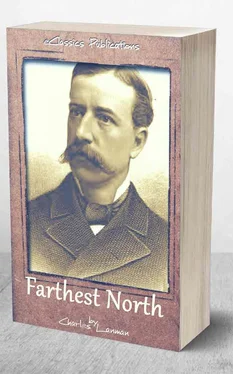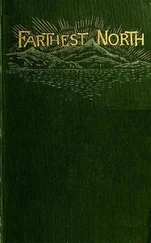Charles Lanman - Farthest North - or, the Life and Explorations of Lieutenant James Booth Lockwood, of the Greely Arctic Expedition
Здесь есть возможность читать онлайн «Charles Lanman - Farthest North - or, the Life and Explorations of Lieutenant James Booth Lockwood, of the Greely Arctic Expedition» — ознакомительный отрывок электронной книги совершенно бесплатно, а после прочтения отрывка купить полную версию. В некоторых случаях можно слушать аудио, скачать через торрент в формате fb2 и присутствует краткое содержание. Жанр: unrecognised, на английском языке. Описание произведения, (предисловие) а так же отзывы посетителей доступны на портале библиотеки ЛибКат.
- Название:Farthest North: or, the Life and Explorations of Lieutenant James Booth Lockwood, of the Greely Arctic Expedition
- Автор:
- Жанр:
- Год:неизвестен
- ISBN:нет данных
- Рейтинг книги:5 / 5. Голосов: 1
-
Избранное:Добавить в избранное
- Отзывы:
-
Ваша оценка:
- 100
- 1
- 2
- 3
- 4
- 5
Farthest North: or, the Life and Explorations of Lieutenant James Booth Lockwood, of the Greely Arctic Expedition: краткое содержание, описание и аннотация
Предлагаем к чтению аннотацию, описание, краткое содержание или предисловие (зависит от того, что написал сам автор книги «Farthest North: or, the Life and Explorations of Lieutenant James Booth Lockwood, of the Greely Arctic Expedition»). Если вы не нашли необходимую информацию о книге — напишите в комментариях, мы постараемся отыскать её.
"Farthest North" by Charles Lanman
Description:
In the 1885 written «Farthest North», Charles Lanman (1819-1895) tells the life story of Lieutenant, and American arctic explorer, James Booth Lockwood, and his deadly participation in the Lady Franklin Bay Expedition, also referred to as the Greely Arctic Expedition.
Farthest North: or, the Life and Explorations of Lieutenant James Booth Lockwood, of the Greely Arctic Expedition — читать онлайн ознакомительный отрывок
Ниже представлен текст книги, разбитый по страницам. Система сохранения места последней прочитанной страницы, позволяет с удобством читать онлайн бесплатно книгу «Farthest North: or, the Life and Explorations of Lieutenant James Booth Lockwood, of the Greely Arctic Expedition», без необходимости каждый раз заново искать на чём Вы остановились. Поставьте закладку, и сможете в любой момент перейти на страницу, на которой закончили чтение.
Интервал:
Закладка:
To the writer of this personal history, it seems as if such sentiments as the above could come only from a young man endowed with the highest instincts of ambition, honor, and true manhood, and can not but be considered, with others of like character, as a suitable passport into the land of Odin and the glories of Valhalla.
During his stay at Omaha, Lieutenant Lockwood was detailed by General Ord, the commanding officer, to visit those counties of Nebraska where grasshoppers had destroyed the crops, for the purpose of determining to whom contributions which had been sent to the general should be given. In this journey of several hundred miles, made in the coldest weather, he visited the several county towns, met the citizens, and afterward laid before the general such testimony as to the destitute, that the bounty was distributed to the satisfaction of all. While on this duty, he traveled ninety miles in twenty-four hours. The county people with whom he conducted business, he designated as “Grasshoppers.” He greatly enjoyed the prairie scenery through which he passed, especially the valley of the Blue.
On the approach of Christmas at Omaha, our young friend had an attack of chills and fever, which sent him to his bed. After deploring that he could not perform his duties on the pending court-martial, he gives us this holiday information: “Yesterday was Christmas, and I am glad that the day comes but once a year. With a large party I was occupied until late in the afternoon making the rounds of the many houses here at the post. In the evening, I ate a fine dinner at General Ord’s, and on top of that, danced in the parlor until eleven or twelve o’clock, and, as a consequence, am coming on as officer of the guard to-day with a most gorgeous headache. So much for Christmas. I have received two or three presents, but have made none myself, from want of funds. I just now heard a tremendous crash, and, on going out, found a fine lunch, sent by Mrs. Ord, scattered on the ground, and in the midst of the débris of broken glass and china, the unfortunate bearer, who had slipped and fallen on the ice in front of the door. I was not particularly sorry on my own account, as I could not have eaten the good things ‘anyhow.’ Upon the whole, Christmas has passed away as it usually does, pleasantly, though at the expense of many unfortunate turkeys. I am sorry I could not send home any presents, my pecuniary affairs being in a straitened condition. I should like very much to be at home about this time. I often wish I could hear Lidie and Anna sing, although I suppose I would find the girls, including Julia and Mary, much changed.”
Remembering young Lockwood’s remarks about whisky-drinking in New York, the following statement is worth quoting: “Most of the ladies at the post received visitors on New-Year’s-day, either singly or in groups. One marked feature of the day was the general absence of liquor, its place being supplied by coffee, chocolate, and other refreshments of a more solid and less stimulating character. I noticed the same thing in town, or rather that at those places where I saw liquor, the ladies were less urgent than is usually the case in pressing it upon the gentlemen. However, there is less drinking at this post than at any other I have seen, as large as it is. Although, with few exceptions, all drink here, it is done quietly at home and without excess.”
As our young friend had narrowly escaped with his life from drowning at Annapolis, so did he from the pranks of an unruly horse at the Omaha Barracks. He was about mounting the horse for a ride, when the animal started on the run before he could get into the saddle, when he was thrown forward upon his head. The trouble was owing to a defect in the bridle. In accounting for his escape, he remarked that his thick head was what saved his life. True to his native pluck, he tackled the same horse a number of times afterward, until the animal—a special favorite—was subdued.
In the month of June, 1875, it would seem as if something like homesickness was weighing down his spirits, for he then began to write about employment in civil life. Not that he disliked the army, but he longed for some business that would enable him to make a little money. He thought he could supply a sufficient amount of energy to prosecute a commercial venture. He felt that there was a great difference between the roads that lead to wealth and to military glory. If his father should chance to see an opening that might give him a fortune in a few days at the expense of a few hundred dollars or some hard work, he wanted to be promptly notified. He broached these business ideas at that time merely for the sake of having a subject for discussion when permitted to visit his home.
The life at the Omaha garrison, during the summer of 1875, was comfortable but monotonous. The faithfulness with which the young officer corresponded with his parents is eminently characteristic of a dutiful son. When not writing about his surroundings and daily duties, or sketching the character of his associates, he ventured to discuss business matters with his father, frequently volunteering a bit of advice. He often alluded to the Annapolis farm and to people and events connected with Georgetown, now a part of Washington City, where he expected the family to remain permanently. On every subject discussed, he manifested a clear head, and enlivened his more serious talk with an occasional joke, for which he seemed to have a fondness. In expressing his opinions on men and things, it seemed impossible for him to hesitate or equivocate; he always went directly to the point, and, though charitable, he could not refrain from looking out for the demands of justice, as, for example, when alluding to the death of a man who had been untrue to himself and friends, he said “to die was about the best thing he could do.” As to his jokes, they were not confined to his private letters, as will be shown by one of them practiced upon the post trader during a dull period in the garrison. The trader in question, a young fellow, had removed the balls from the pistol of one of his clerks, with the intention of playing a ghostly trick upon him that night. He told Lockwood and another friend of his intention, and they determined to turn the tables upon the trader. They notified the clerk, and at midnight the amateur ghost rose from his bed, enveloped himself in a white sheet, and stole softly into the room of the unsuspecting clerk. Just then an improvised noise was made outside the door, when the clerk seemingly awoke with an exclamation of terror at seeing the ghost. The report of the pistol was duly followed by the return of the ball held in hand, à la ghost, but immediately after, the poor ghost found himself completely drenched with a bucket of water, which had been coolly set aside for that purpose. At this unexpected turn of affairs, the trader fled in the greatest consternation, leaving his “trade-mark” behind, and, as he passed out of the door, received a second pail of water from one of his ghostly companions. The result was that it took a long time for him to dry his saturated skin, and a much longer for his title of Mr. Ghost to be lost by the garrison boys. Not long after the above incident, this personage found that there was not “the ghost of a chance” of his continuing in business, as he became insolvent and had to retire. It would appear that while many of these military merchants on the frontiers have a chance to make fortunes, those who are located near a city like Omaha find it difficult to make both ends meet in their business affairs.
On reading the proceedings of Congress during the winter of 1875, he writes to his father as follows: “Congress seems to be looking around for some scape-goat on which to pile the odium of the millions legislated away, and, as usual, pitches on the army. It seems to be the opinion here, however, that no reduction will take place this winter. If Congressmen consulted occasionally others than the staff-officers living in Washington with regard to military affairs, they might find out the true whereabout of the tremendous rat-hole which swallows up annually the sum of thirty-four millions of dollars. It does not go to support the army proper, but to support that enormous, overgrown, expensive adjunct of the army, the staff, which, created merely for the administration of the army, now masters that which it was intended to subserve, and has become superior to it in rank and influence, and in everything that rank and influence can bring. But Congress seems to be blind to the fact that expenditures are credited to the army, under the army appropriation bill, which have no legitimate connection with it, and which would still be required if no army existed. Why is it that the army is the perpetual foot-ball of these demagogues? Is it thus, at every session, to be bantered about by those who do not understand the requirements of the country in this respect? Is not the causing of this periodical uncertainty respecting his fate the most pernicious thing that Congress can do to an officer? O consistency, thou art a jewel! How is it that the navy and other branches of the public service are not subject to this constant tinkering? But I am not in Congress, and had better subside.” The assertions here made can not be controverted, and, coming from a young man who had but recently passed his majority, prove him to be the possessor of very substantial abilities. He also expressed decided opinions in regard to various noted officials charged with improper conduct in Washington at the time alluded to, all of which have been sustained by subsequent developments.
Читать дальшеИнтервал:
Закладка:
Похожие книги на «Farthest North: or, the Life and Explorations of Lieutenant James Booth Lockwood, of the Greely Arctic Expedition»
Представляем Вашему вниманию похожие книги на «Farthest North: or, the Life and Explorations of Lieutenant James Booth Lockwood, of the Greely Arctic Expedition» списком для выбора. Мы отобрали схожую по названию и смыслу литературу в надежде предоставить читателям больше вариантов отыскать новые, интересные, ещё непрочитанные произведения.
Обсуждение, отзывы о книге «Farthest North: or, the Life and Explorations of Lieutenant James Booth Lockwood, of the Greely Arctic Expedition» и просто собственные мнения читателей. Оставьте ваши комментарии, напишите, что Вы думаете о произведении, его смысле или главных героях. Укажите что конкретно понравилось, а что нет, и почему Вы так считаете.












